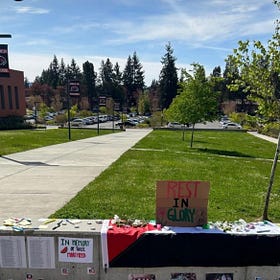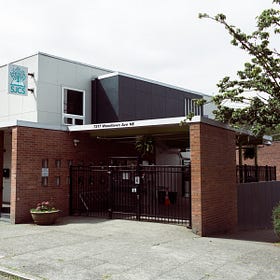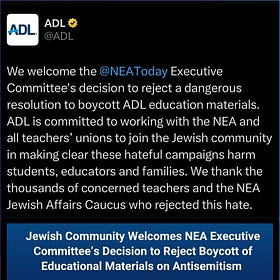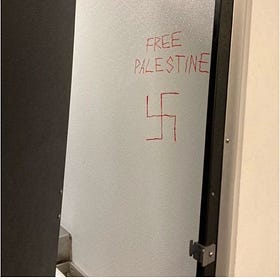Are the Schools Finally Learning?
It took two years, but some Seattle-area public schools may be showing signs of progress in their treatment of Jewish students and families.
For the past two years, reports of hostile behavior toward Jews in Seattle-area public schools have flowed in. Students, teachers, and parents have shared accounts of slurs, graffiti, and harassment — much of it occurring without significant consequence.
However, the 2025-26 school year may be off to a better start, with local Jewish organizations finally seeing a return on their efforts to get through to districts and administrators. The Jewish community has started to get off the back foot, having operated in a defensive stance since October 7th and the anti-Israel reaction that followed.
“I do think superintendents and administrators are more knowledgeable about these activities and they’re a lot more swift in taking action,” says Miri Cypers, regional director of the Anti-Defamation League. “They've been communicating well with Jewish parents, and I think people are more savvy about what is problematic.”
Max Patashnik, director of the Jewish Communal Relations Council for the Jewish Federation of Greater Seattle, agrees that the landscape is shifting.
“I think holistically, it feels like it’s time to really make a shift out of the fire-alarm, responsive mode that so many of us have been in, in the post–October 7th world, where anti-Semitism has shown up like we’ve never seen before, including in schools,” she says.
That doesn’t mean anyone is out of the woods. This October 7th, a loose federation of Marxist organizations is planning a walkout in solidarity with the perpetrators of the massacre. Rather than react to that, the JCRC has already circulated a letter that parents can send to their school administrators to remind them of their responsibility to Jewish student safety.
The letter outlines the Tinker v. Des Moines decision, which administrators can legally refer to if walkouts become disruptive or threatening. Many student protests have been disruptive but have gone unaddressed due to principals’ fear of violating the First Amendment.
“It is a balance between free speech rights and disruption to the school day and the potential presence of a hostile environment for Jewish students,” says Randy Kessler, director of Israel education organization StandWithUs Northwest. “Just because someone has the right to say hostile things to Jews doesn’t mean it doesn’t create a hostile environment. I’ve gotten a lot more sympathetic to the challenges of administrators, but only to a point. They should know how to deal with it. It’s not that hard.”
Kessler cites the Bellevue School District, on the east side of Lake Washington, as a success story. In the spring of 2024, StandWithUs sent a nine-page letter to the BSD listing numerous claims of harassment and intimidation and demanding action. The district also worked with the JCRC on a Project Shema training, which presents anti-Semitism awareness and education through a progressive lens. “It went from us fighting them to us working with them,” Kessler says.
The jury is still out on other districts with known issues. Lake Washington School District is under a federal Title VI investigation; StandWithUs brought that complaint following an on-campus student protest that left Jewish students feeling threatened and isolated. However, the Office of Civil Rights has been downsized by the Trump administration, so results may not been seen for some time.
Kessler has also reached out to the new superintendent of North Shore, north of Seattle, a district with a history of liberated ethnic studies and an anti-Israel board member. The district has at least responded, he says. “There’s a pulse.”
Seattle Public Schools has been notoriously hard to reach, with its large size, left-leaning bent, unstable leadership, and budget problems, but Patashnik says that for the first time, someone from the superintendent’s office reached out to the JCRC.
“He actually sent me a whole bunch of policies, like their code of conduct and harassment, intimidation, and bullying policies, and asked me, ‘Will you take a look at these to see if they're inclusive of Jewish students?’” Patashnik says. “So I think there’s starting to be recognition that addressing antisemitism has to be systemic — not just a reaction like, ‘Oh, we’re horrified there was a swastika at our school.’ Or worse, not saying anything at all.”
While some may criticize the slow-going, coalition-building approach in favor of more direct action, especially after seeing many progressive allies fail to defend the Jewish community, Patashnik sees partnership as an essential part of her job.
“There are parts of the Jewish community, whether on the far left or far right, who are more in-your-face, loud, unafraid to tear things down. And that model works for some,” she says. “But when we’re looking at the arc of 10 years from now — what Jewish safety and inclusion look like in Washington state schools — I don’t think that’s the primary way we’re going to get there. And honestly, I don’t think allyship is in a place right now where it could sustain that kind of movement. Jews are 2 percent of the population. If even all the Jews showed up, it still wouldn’t be a large crowd.”
Patashnik also points out a larger issue: threats against Jews are often stemming from the same ideology that threatens other minorities.
“I’m not only trying to help people understand who Jews are and what anti-Semitism is,” she says. “I’m also working to help them understand why it matters to them. If I’m not Jewish, why should I care? Like it or not, we have to get better at helping people see that they have skin in the game.”
Most people are not anti-Semitic, Kessler notes, but “I do believe there is a presumption that Israel is the bad guy in way too many places in our educational system.”
Separating the politics from identity is one thing, but explaining how political speech can cross into anti-Judaism — and then enforcing policy to combat it — is tricky. It’s no wonder school prinicipals have tried to avoid it. Kessler encourages parents to send the JCRC walkout letter and to speak up and reach out for help when they need it.
“Our challenge is connecting with parents in individual schools,” he says. “It would be great if parents could be organized and work with someone in the Jewish community.”
All three organizations have resources available.
“There are a lot of systemic challenges that are hard to overcome,” Cypers says. “I do think we have developed important teaching tools for educators and administrators. We have a lot of best practices about how schools can create a warm and safe environment.”
Are you or your child in a non-Jewish school? Share your experiences — good, bad, neutral — with The Cholent. Just hit reply or write to thecholentseattle@gmail.com.
Cover photo of Tillicum Middle School by Jaydn Scandora/Unsplash
More education coverage:
How Are Local Public Schools Handling Anti-Semitism?
This week’s story is a collaboration of research and writing by local education writer, author, and editor Linda Morgan and myself.
As Public Schools Reel, Jewish Day Schools Grow
Arlana Angel and her husband, Noam Schafer, had made their decision: This fall, their daughter would start kindergarten at the public school near their home on Beacon Hill. It was a decision they considered deeply and ultimately felt would be right for their family.
The State of the Unions
In early July, delegates at the National Education Association Representative Assembly in Portland, Oregon, narrowly voted to cut ties with the Anti-Defamation League. After an intense period of review, the NEA board rejected the proposal. According to a
What Is so Hard About Keeping Jewish Students Safe?
A new lawsuit claims that administrators at a Seattle high school failed to keep a Jewish student safe from threats of violence and that they discriminated against her by allowing students to harass her to the point where she had to hide from an angry mob in a locked classroom.
Announcements
Check out the Seattle Jewish community calendar.
Candlelighting in Seattle is at 6:54 p.m. The parasha is Nitzavim.
Rabbi Anson Laytner’s play, The Animals' Lawsuit Against Humanity, which is based on Dan Bridge and my story of the same name, which was based on Rabbi Kalonymus b. Kalonymus' 14th century story, which itself was a Hebrew translation of a Muslim fable from the 10th century, will have its theatrical premiere on September 24th during Climate Week NYC at the Five Angels Theater.
Parents interested in strategizing or getting help for their Jewish students can reach out StandWithUs Northwest at northwest@standwithus.com or 206-801-0902.
Fall semester applications for the StandWithUs Teen Leadership Council: https://standwithus.com/high-school/programs/teen-leadership-council/.
Read the new edition of Distinctions, JIMENA’s journal of Sephardi and Mizrahi thought:
Shoutouts
Shoutout to the families who enabled the JCC remodeling! —Carla Tobis
Shana tova - wishing you all a sweet new year!







